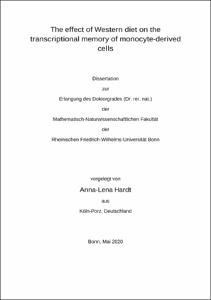The effect of Western diet on the transcriptional memory of monocyte-derived cells

The effect of Western diet on the transcriptional memory of monocyte-derived cells

| dc.contributor.advisor | Schultze, Joachim L. | |
| dc.contributor.author | Hardt, Anna-Lena | |
| dc.date.accessioned | 2020-12-11T16:37:33Z | |
| dc.date.available | 2020-12-11T16:37:33Z | |
| dc.date.issued | 11.12.2020 | |
| dc.identifier.uri | https://hdl.handle.net/20.500.11811/8843 | |
| dc.description.abstract | Monocytes and monocyte-derived cells are very plastic and versatile immune cells that react to different environmental signals. These signals include not only pathogen-associated molecular patterns (PAMPs) and damage-associated molecular patterns (DAMPs), but also dietary compounds, taken up into the blood stream. Circulating free fatty acids (FFAs) are associated with a multitude of chronic inflammatory diseases. It is well established that plasma FFA concentrations are significantly increased in close association with obesity, which in turn is associated with the accumulation of immune cells such as macrophages and dendritic cells. However, previous studies have shown that these immune cells react differently to saturated and unsaturated FFAs. Thereby, the saturated FFA palmitic acid (PA) has been shown to provoke a pro-inflammatory phenotype in cultured macrophages while the mono-unsaturated fatty acid (MUFA) oleic acid (OA) is rather described to triggers an anti-inflammatory phenotype. In the current work, we combined the analysis of the direct effects of OA and PA on monocyte derived cells with the evaluation of provoked ‘trained immunity’ or ‘tolerance’ upon re-stimulation with LPS.
Although gene expression data poke another expectation, in terms of TNF and IL-6 secretion data, we could show that either the UFA oleic acid as well as the SFA palmitic acid provoke a training effect in human monocyte-derived cells, with OA inducing a stronger effect than PA. To understand the molecular mechanisms essential for the development of a training effect in monocyte-derived cells, a deeper view of epigenetic modifications initiated by fatty acid intermission would be reasonable. The evaluation of such findings might enable us to better understand the effect of diet leading to immunological diseases. | en |
| dc.language.iso | eng | |
| dc.rights | In Copyright | |
| dc.rights.uri | http://rightsstatements.org/vocab/InC/1.0/ | |
| dc.subject | Trainned innate immunity | |
| dc.subject | oleic acid | |
| dc.subject | palmitic acid | |
| dc.subject | monocytes | |
| dc.subject | monocyte-derived cells | |
| dc.subject | macrophages | |
| dc.subject | western diet | |
| dc.subject | tolerance | |
| dc.subject | RNA-seq. | |
| dc.subject | cytokine | |
| dc.subject | ATAC-seq.,ChIP-seq. | |
| dc.subject | transcriptome | |
| dc.subject | epigenome | |
| dc.subject | epigenetic | |
| dc.subject.ddc | 570 Biowissenschaften, Biologie | |
| dc.title | The effect of Western diet on the transcriptional memory of monocyte-derived cells | |
| dc.type | Dissertation oder Habilitation | |
| dc.publisher.name | Universitäts- und Landesbibliothek Bonn | |
| dc.publisher.location | Bonn | |
| dc.rights.accessRights | openAccess | |
| dc.identifier.urn | https://nbn-resolving.org/urn:nbn:de:hbz:5-60532 | |
| ulbbn.pubtype | Erstveröffentlichung | |
| ulbbnediss.affiliation.name | Rheinische Friedrich-Wilhelms-Universität Bonn | |
| ulbbnediss.affiliation.location | Bonn | |
| ulbbnediss.thesis.level | Dissertation | |
| ulbbnediss.dissID | 6053 | |
| ulbbnediss.date.accepted | 13.11.2020 | |
| ulbbnediss.institute | Mathematisch-Naturwissenschaftliche Fakultät : Fachgruppe Molekulare Biomedizin / Life & Medical Sciences-Institut (LIMES) | |
| ulbbnediss.fakultaet | Mathematisch-Naturwissenschaftliche Fakultät | |
| dc.contributor.coReferee | Beyer, Marc |
Dateien zu dieser Ressource
Das Dokument erscheint in:
-
E-Dissertationen (4071)




